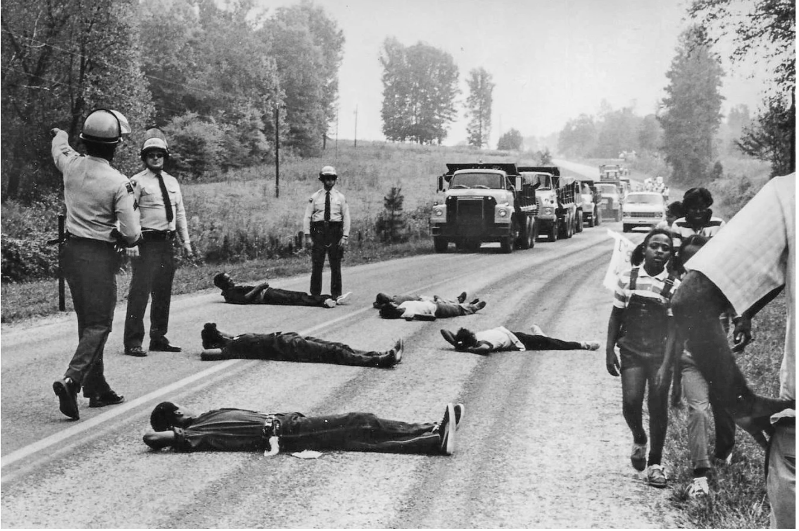Black people block the delivery of toxic waste to a landfill in Warren County, N.C., in 1982, in response to the state locating a hazardous waste landfill in their low-income, predominantly Black area. Image credit: Jenny Labalme SOURCE: NPR
The nonprofit world is a funny thing. You’ll hear a lot how important it is for good causes to “reach new audiences”. And to “broaden the appeal of our work.” But when it comes to doing it? There’s a lot less of that going on. We love to talk. We love to produce strategic frameworks. Consultants like me, even, are sometimes drafted in to help. But then, our work might sit on a hard drive, gathering dust. (*There’s a great FT interview this week with a UCL professor critiquing consultancy. I recommend it!)
Still, I tend to think consultants CAN help nonprofits communicate. We CAN get them unstuck. And with a funder’s help, we can engender a mindset shift from looking inwards to engaging out. The key is for funders to step up and back this kind of mindset shift, in meaningful ways. I hate to say it, but mindset shifts don’t happen on the side of a desk. They need hand-holding and capacity development. You have to seed great results before nonprofit CEOs get enthused about communication. That takes intentional investment and time. It takes editorial meetings.
Why am I writing about all this? Well. I was talking this week with a fellow nonprofit consultant in India. A foundation there has commissioned a report on communications. She asked me, “where do climate-focused organizations tend to need your support?” So, I told her. They want help turning their complex messaging into simple messaging frameworks. In some cases, they want help turning their 130-page reports into 1,200-word blogs. They might want help turning their dense newsletters into more digestible forms. The main thing climate groups know they need to do better is talk to people who don’t work in climate change.
But. These groups often rely on external consultants for this kind of support. Funders might prod them in the right direction by saying, “you need to talk more to the unconvinced.” But in climate change, particularly, I’ve found organizations resist doing so. It’s their makeup. Once they hire a consultant, that person gets enmeshed in their internal workings. Before you know it, somebody who walked in the door writing crisp headlines is talking like an Oxford don.
In the United Kingdom, where I’m from, there’s an interesting class wrinkle in climate work. Okay, it’s not just in climate work. It’s across British society. But many of the people in charge are posh (the word comes from which side of the boat you’d take, crossing the Atlantic). In climate work, leaders air their disapproval of the unconverted. There is comfort with being exclusive. That’s not the best way to win someone over. Meanwhile, populists executed Brexit. In the United States, the climate movement has been sexist and white supremacist. The roots of the U.S. conservation movement over a century ago linked to eugenics. Meanwhile, the effects of climate change are worst experienced by Black people. I love the image in the header here of local Black people protesting the location of a toxic waste landfill in North Carolina in 1982. In part, I was surprised by it. The bias is that white people do environmentalism. Yet one could argue that we might do best to back off. This is about power.
As a strategic communications consultant to good causes, I believe in being pragmatic before it is too late. The funders of climate work need to rank external engagement and measure it. They need to say to a chief executive, “it’s your job to focus on building broad support for change.” And leave them freer to do that without producing too many documents few people read.
These are lessons that apply to all good causes, of course. Not only to environmentalism. Basically, it’s not fair to blame nonprofits for failing to reach a broader audience. That’s because the foundations doing the bulk of the funding of such organizations don’t incentivize it, and as a result, they’re letting society down. It’s no wonder more and more grassroots organizations are focused on fundraising directly from the people they serve. Then they can be more direct in speaking truth to power and advocating more urgently for change. Meanwhile, if you work at a foundation, reading this, and want to talk about being braver about all this, let’s talk. I promise there are strategic ways to do it that will make your work more effective. Better yet, we might all achieve the change we’re talking about, together. One can dream!


